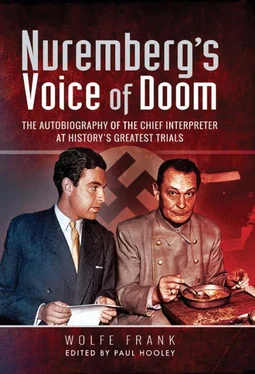Two poison capsules had previously been found amongst Goering’s possessions – one in the hollowed-out pages of a book and one in a tin of coffee. Such places of hiding were absurdly poor for a man of Goering’s intelligence. Rather, I feel, he wanted those capsules found. To some extent, this would have dulled the minds of further searchers and it might produce the subconscious conclusion that ‘two is all he could have had.’
Let us return to the somewhat simple-minded Colonel Andrus. He certainly instituted searches and controls of the prisoners. It went something like this: Every Monday: search blankets. Every Tuesday: look under the seats of the toilets in the cells. Wednesday: windowsills. Thursday: the prisoner’s mouths. Friday: the rectum; and so on and so forth. The odds in favour of the brilliant mind of a Goering versus such military non-ingenuity must have been enormous. Goering had no other aim or purpose than to outwit his jailers. He succeeded. Whether he had the eventual capsule that killed him all the time or whether it was smuggled into the jail for him seems to me to be of secondary importance. It should have been found in either case, and the job was bungled. It certainly changed the record, but I don’t think the history of the world was changed greatly.

37. THE EXECUTIONS
THE EVENTS DURING THE NIGHT OF THE EXECUTIONS are a matter of record. I, myself, couldn’t stay away. That the hangings would take place during that night was certain since the time between the sentencing and execution, set at fifteen days by the rules governing the trial, had elapsed. Midnight on 16 October 1946 was it.
The setting was exactly as a film director would have wanted – a little moonlight, clouds racing across the sky, a night almost without sound. The Press Corps was there, of course, in full strength and, as their papers were being checked by the Military Police, everybody it seemed was talking in a whisper.
Eleven lives were to be taken that night, as the result of a gigantic effort to examine a record of crime, of murder, of inhuman brutality that has no parallel in history. We had, all of us who were at the Palace of Justice in Nuremberg on that night, attended this examination and, I feel sure, we wanted to see that final act of justice carried out.
I cannot imagine that any one of us felt the tiniest spark of compassion for the men who were now to die for their crimes. However, I also felt that we all would be glad when at last this horrible chapter of history that we had helped to record was ended.
To cover the final act the authorities had ruled that two journalists from each of the Allied Powers were to be admitted to the hangings – one representative of the Press and one radio reporter.
The Americans had made clever use of this arrangement as they had somehow managed to obtain a ruling whereby those eight men – two Americans, two Brits, two Frenchmen and two Russians – were to be allowed out of the jail at 04.00 hours after the executions. This, of course, was early enough for the press in the United States but too late for Europe. It certainly wasn’t cricket, but good American business sense.
Until 04.00 hours the prison was hermetically sealed off. At 01.00 hours I decided I had hung around the building long enough, and I headed for home. A US woman reporter, who shall remain nameless, was with me. At the exit she was stopped by an MP sergeant who obviously knew her well. ‘Hey Jeannie,’ he called as we walked by, ‘Y’know what? Goering’s just killed himself.’
‘Ha, ha, funny joke,’ Jeannie said, and walked on, heading for her couch and a nap. Had she taken the MP seriously and followed up his information she would have scooped the whole of the world’s press by three or four hours, and she would have become world famous.
A second anecdote concerns Britain’s most illustrious daily. It had two people on the spot that night, both of who were young, very ingenious and determined to give everybody else the slip. They hired a couple of Germans, equipped them with field glasses and had them climb to the top of a ruined building across the road from the Palace of Justice. By careful scouting they had discovered that from this lookout point their spies would be able to see the gangway, which had been constructed between the prison and the gymnasium, in the courtyard where the gallows had been erected. A gap had been left open at the top of the gangway, presumably to let in daylight.
Obviously, the condemned men would be walking to the gallows singly. Each would be preceded, and followed, by an MP wearing the white helmet of his uniform. The tops of these helmets ought to be visible to the two German lookouts, posted on top of the ruins across the road from the Courthouse – and, indeed, they were. First one helmet could be seen, glistening in the light of a naked light bulb or two in the gangway. Some ten feet behind, a second helmet could be discerned. This, clearly, was the procession of a death candidate being led to the gallows and a light signal, blinked to the two Englishman below, reported the passing of each such procession.
What the lofty observers could not, of course, have known was that the last of the eleven men was not walking, but was being carried on a stretcher, already dead. It was Hermann Goering who had just killed himself!
Thus, when eleven pairs of helmets, obviously with eleven death candidates between them, had passed, the story was filed with London, and there we read how Goering, the first man due for execution, had ‘Walked, his head erect, face emotionless, to the gallows and his death.’

38. THE SUBSEQUENT PROCEEDINGS
Editor:Following the International Military Tribunal (IMT) – the trial of the major Nazi war criminals (Goering, et al.) – other Germans were arrested and brought before the courts to face charges in a series of hearings that were officially entitled, ‘The Trials of War Criminals before the Nuremberg Military Tribunals’. These trials are, however, usually referred to as being the ‘Subsequent Proceedings (SP).’
Growing differences between the Allies (the US, the UK, France and Russia) had made it impossible to run further trials along the lines of the IMT. However, the Allied Control Council Rule 10 [1] Nuremberg Trials Final Report Appendix D: Control Council Law No. 10 , by Telford Taylor.
was a charter that allowed for a ‘Uniform legal basis in Germany for the prosecution of war criminals and other similar offenders other than those dealt with by the IMT.’
After the conclusion of the IMT, and under this directive, the US held a series of twelve SP trials [2] The Trials of War Criminals before the Nuremberg Military Tribunals (Subsequent Proceedings) were as follows:
within the Palace of Justice at Nuremberg, between December 1946 and April 1949, at which other Germans, including politicians, industrialists, high ranking military personnel, physicians and jurists, were charged with war crimes.
General Telford Taylor, [3] Telford Taylor (1908-1998) was an assistant to Chief Counsel Robert Jackson at the IMT. In October 1946 he was promoted to Brigadier General and appointed Chief Counsel for the Subsequent Proceedings.
who was one of the US assistant prosecutors under Mr Justice Jackson at the IMT, was appointed Chief Prosecutor and Wolfe Frank was appointed Chief Interpreter of the SP, and the courts were set up to, ‘Try and punish persons charged with offences recognized as crimes in Article II of the Control Council Law No. 10.’
Читать дальше














